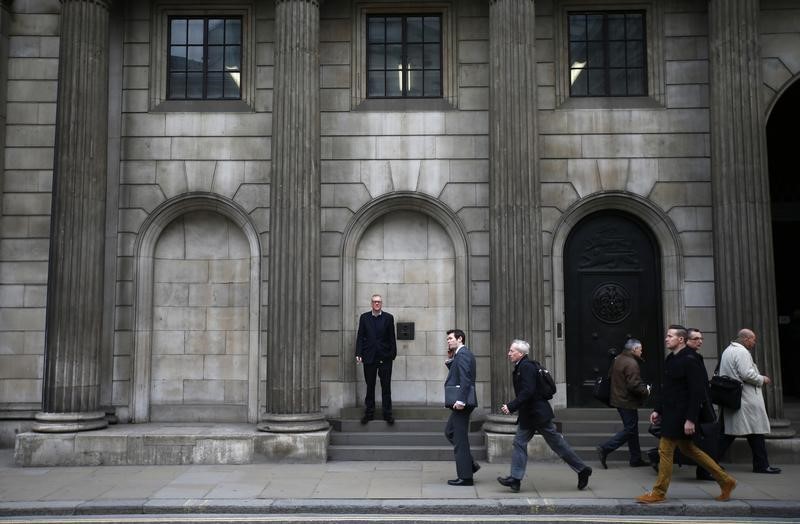Proactive Investors -
- FTSE 100 up 32 points at 7,662
- Bank of England leaves interest rates unchanged
- Shell (LON:RDSa) launches $3.5bn share buyback
Bank of England leaves interest rates unchanged
The Bank of England's Monetary Policy Committee has left UK Base Rate unchanged at 5.25% at its first meeting of the year.
The vote was a 3-way split with one member voting for a cut, two for a rise and six to leave rates unchanged.
The BoE also dropped guidance linked to further tightening.
The decision to leave rates at a 16-year high means the BoE has decided to maintain rates at successive meetings in September, November, and December.
The BoE has enacted 515 basis points worth of hikes since lifting bank rate from its pandemic-induced low of 0.10% roughly two years ago as it seeks to reduce inflation to its 2% target.
Nasdaq set to rally after heavy losses
Stocks in New York are expected to rally following heavy losses Wednesday after the Federal Reserve Chair Jerome Powell knocked back hopes for an interest rate cut in March.
In pre-market trading, futures for the Dow Jones Industrial Average were up 0.1%, while those for the S&P 500 rose 0.3% and contracts for the Nasdaq 100 futures declined 0.5%.
In a press conference which followed the decision by the Federal Open Market Committee to leave interest rates unchanged for a fourth meeting in a row, Powell said a rate reduction in March, was not the "most likely case."
"I don’t think it's likely that the committee will reach a level of confidence by the time of the March meeting, to identify that March is the time to do that," he said in a press conference.
James Knightley at ING Economics said the Federal Reserve "doesn't seem to be in a hurry to cut interest rates."
"We still think May is the more likely start point for policy easing rather than March, even if the arguments for earlier moves are building."
"We suspect that the Fed recognises its credibility was damaged by its 'inflation is transitory' assertion in 2021 only to have to rapidly reverse course with significant rate hikes through 2022 and 2023."
"The last thing the Fed wants to do is get it wrong again at a key turning point, loosen too soon, too quickly and reignite inflation pressures," he added.
Goldman Sachs (NYSE:GS) agrees, pushing back its expectations for a first rate cut to May from March.
“We now expect the FOMC to deliver four consecutive cuts at the May, June, July, and September meetings before slowing to a quarterly pace and adding a final cut this year in December.”
Bank of America (NYSE:BAC) pushed back its forecast for a first rate cut to June.
Away from interest rate speculation, it is another bumper day of earnings with tech heavyweights Apple (NASDAQ:AAPL), Meta and Amazon (NASDAQ:AMZN) reporting after the closing bell.
In economic data, weekly jobless claims figures will be reported ahead of the US jobs report on Friday.
Red Sea difficulties hit manufacturing - S&P
The downturn in the UK manufacturing sector continued at the start of 2024 with January seeing output and new orders decline further, a survey showed Thursday.
Supply chain difficulties as the Red Sea crisis led to the re-routing of input deliveries away from the Suez Canal added to the sector’s woes.
The seasonally adjusted S&P Global UK Manufacturing Purchasing Managers’ Index posted 47.0 in January, up from 46.2 in December but below the earlier flash estimate of 47.3.
Rob Dobson, Director at S&P Global Market Intelligence, said the Red Sea crisis had led to rising prices and extending supplier lead times.
Businesses estimated that a minimum of 12-18 days could be added to some expected deliveries, disrupting production schedules and raising inflationary pressures.
Eurozone inflation eases in January but core above forecast
Consumer price inflation cooled in January in the eurozone, official figures showed on Thursday, while unemployment remained steady in December.
According to Eurostat's flash estimate, annual consumer price inflation ebbed slightly to 2.8% in January, from 2.9% in December.
But core inflation - which strips out food and energy - eased to 3.3% from 3.4%, and came in slightly above consensus of 3.2%.
ING Economics said while today’s figure still shows easing price pressures, "it is far too soon to give the all-clear on inflation."
It noted the ECB hopes that higher wages will be partially absorbed by lower profit margins.
"But if growth starts to pick up again in the second quarter, companies might have the pricing power to withstand margin compression, so inflation won't come down much further. "
"This is why we continue to believe that the ECB will be very cautious and will not contemplate any rate cut before June."
